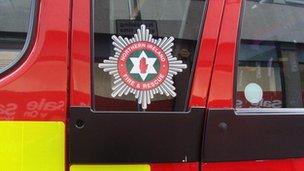NI Fire Service had to deal with 126 grievance cases in past decade
- Published

The BBC has learned that the Northern Ireland Fire Service (NIFS) has had to deal with 126 grievance cases in the past decade.
Twenty-two of these remain outstanding despite being lodged several years ago.
At the same time, the service was involved in 54 industrial tribunals.
Around half of these were withdrawn, 10 were settled without admission of liability, four were settled and there are nine cases pending. Almost £50,000 has been paid in compensation.
Of the 22 outstanding grievance cases, almost half relate to Fire Service headquarters in Lisburn.
The detail comes against the the backdrop of strong criticism about the way the service was managed over a number of years.
The Health Minister Edwin Poots, who has responsibility for the service, is expected to publish the results of two major internal investigations next week.
A senior law lecturer, who specialises in employment law, has described the number of cases taken against the fire service as "stark reading".
Dr Esther McGuinness from the University of Ulster's School of Law also highlighted that the time taken to deal with grievances - up to two years in some cases - could breach people's rights, under the Human Rights Act, to a fair and timely hearing.
Dr McGuinness told the BBC that it would be "unheard of today to have a prisoner on remand for two years, or more, it is therefore unjust to expect someone to wait over two years for a grievance to be heard".
Dr McGuinness said "both the fire service and the Department of Health are continuing to fail in their statutory duties to expedite these hearings".
A letter seen by the BBC also suggests that the most senior official in the Department of Health has been concerned about the length of time some cases have been taking.
Wages
The department's Permanent Secretary wrote to the chairman of the Northern Ireland Fire Service urging the organisation to conclude all outstanding grievances and/or harassment complaints in relation to a number of people.
In May 2012, Dr Andrew McCormick asked Dr Joe McKee to forward to him as soon as possible "confirmation that these matters have been concluded."
The BBC has also learned that an independent arbiter was employed by the Fire Service to investigate one particular grievance case.
While this report was issued to the chairman and several others in October 2011, it has never been made public. The BBC understands that the outcome was favourable to the claimant.
Two of the most recent grievance cases have been taken against the same member of staff.
Despite this, the person has been allowed to remain in post and in the same office. A procedure which Dr McGuinness says is against normal best practice in terms of staff relations.
In a further development, the BBC understands that the Fire Service is facing a High Court action for unlawful deduction of wages from a former senior manager who left the service this year.
- Published4 October 2012